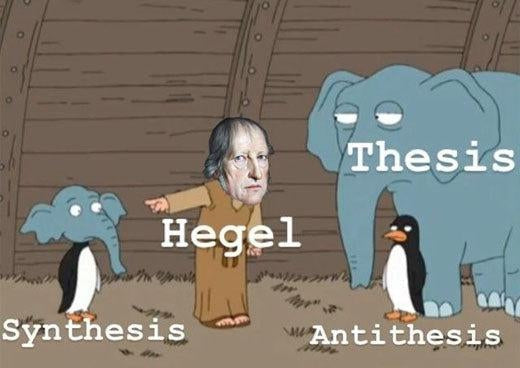

· By Markus Uehleke
Hegel and the concepts of dialectic

Hegel's dialectic is usually presented in three stages of development: a thesis that leads to its reaction; an antithesis that contradicts or negates the thesis; and the tension between the two is resolved by a synthesis. Although this model is often named after Hegel, he never used this specific formulation. Hegel attributed this terminology to Kant. However, continuing Kant's work, it was the German philosopher Fichte who greatly developed and popularized the synthesis model.
On the other hand, Hegel certainly used a three-valued logical model very similar to the antithesis model, but Hegel's most common terms were: Abstract-Negative-Concrete, where "Aufhebung" means the point of hinging on the concrete. However, he never used the word "sythesis" as a synonym. Hegel nevertheless used this logical model as a backbone to accompany his points in many of his works.
This is, of course, nevertheless a highly simplified abridgement of the methodology referred to by the technical term "dialectic." But it seems useful to emphasize that this is not about discourse analysis or simple pro and con juxtapositions familiar from the formal didactics of an essay. Hegel was much more concerned with the development of the so-called "world spirit" - a somewhat poetic formulation of a historically optimistic idealism - and how it changes in the form of a progression and approaches its final ideal.
The "Phenomenlogy of Spirit" thus describes an attempt to take a snapshot of certain phenomena within the dialectical rule of three described above. One can see this, among other things, in societal paradigm shifts.
For example, if as a society we have moved away from the idea that children are good miners because of their size, this has resulted from the antithesis of workers' or children's rights, which are also based on an idea that in turn comes from an ideal and manifests itself in laws. These, in turn, are the basis for further progression, insofar as no one would seriously doubt that children should work in mines, which, frighteningly, is still the case in parts of the world.
It is not necessary to identify as a Hegelian to support the concept of the dialectical three-step. Marx and Engels, for example, had literally turned Hegel upside down by relating the method of dialectics not to an idealism (i.e., the development of ideas) but to concrete material conditions that reveal themselves in reality in the class struggle. For this reason, among others, the entire concept has a topicality to this day as hardly any other methodology of philosophy does.
So, you've just finished reading the funniest and most enlightening blog article ever written (we simply like exaggerations). Your mind is blown, your sides ache from laughing, and you would like to enjoy this experience regularly. Here's the kicker: you can simply subscribe to our free memesletter to get just such memes and their explanation delivered to your inbox on a weekly basis. Simply sign up at the bottom of this page!
Additionally you realize that you absolutely need some merch to commemorate this momentous occasion. Well, lucky for you, we've got the perfect selection of witty t-shirts, hilarious mugs, and sassy stickers that will forever remind you of that time you read that incredible blog post. And here's the cherry on top - use the promo code "BLOGREADER" at checkout to get a whopping 15% off your entire order! It's like getting a discount on instant joy and everlasting awesomeness. So go ahead and snag some swag, my friend. You deserve it.











